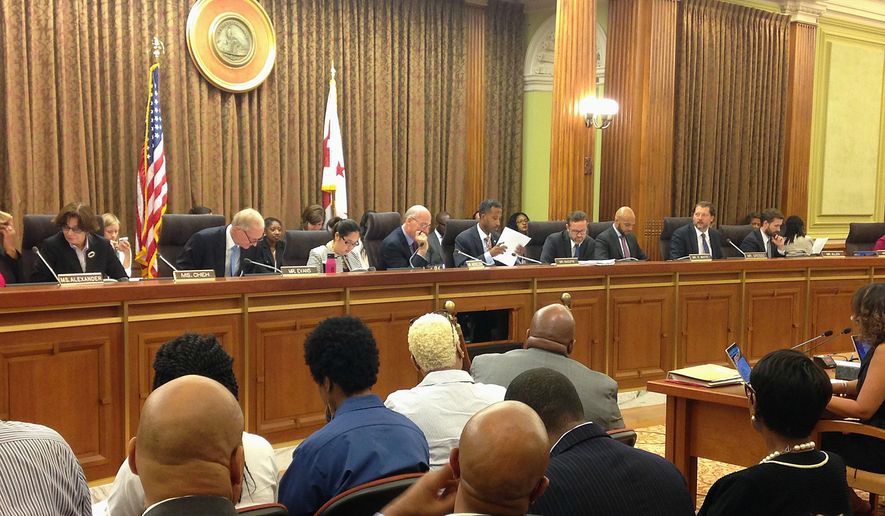With more than 100 workers protesting outside City Hall, the D.C. Council voted Tuesday to table a bill that would force some businesses to provide employee schedules weeks in advance, likely ensuring the legislation will not be approved before the end of the year.
Lawmakers voted 9-4 to table the Hours and Scheduling Stability Act, which now will have to be reintroduced when a new council is seated in January. Council members Mary Cheh, LaRuby May, Brianne Nadeau and Elissa Silverman voted to keep the legislation active.
A two-thirds majority could vote to take the legislation off the table, but that probably won’t happen, a council source said.
“It is unlikely it will be taken off the table soon, as two-thirds voted to table it today,” the source said. “That does not mean it’s dead, there is just no timetable on when it would be taken up again.”
Many labor advocates had thought the council would vote on the bill by year’s end when it was bumped from council’s July 8 meeting before the summer recess. Earlier this year, city officials enacted a $15-an-hour minimum wage law, and lawmakers expressed strong support for a generous paid family and medical leave bill.
Elizabeth Falcon, executive director of D.C. Jobs with Justice, said Tuesday that city lawmakers turned their backs on residents by tabling the scheduling bill.
SEE ALSO: Federal appeals court panel questions D.C.’s concealed carry laws
“The D.C. Council should have kept Hours and Scheduling Stability Act on track to make sure our community has access to stable hours and work schedules,” Ms. Falcon said. “The council let down thousands of our neighbors who work in retail and food service and all of their families. By tabling this legislation, they gave into big business lobbyists instead of looking out for hard-working residents in our lowest paying industries.”
Under the bill, which the council’s Business, Consumer and Regulatory Affairs Committee approved in June, D.C. retailers and restaurants with more than 40 locations nationwide would have to set work schedules at least two weeks in advance.
Ms. Silverman, an at-large independent who has backed the scheduling bill and other business-related legislation, chided her fellow council members for their decision. At a breakfast Tuesday, she asked her colleagues not to table measure but to submit it to the newly created Subcommittee on Workforce.
“I told my colleagues that I would use the next three months to convene meetings with them to understand and work through their issues with the current bill. Unfortunately, a majority of the council voted to table the bill, which effectively kills it this session,” she said after the tabling vote.
“I will start to convene working groups on this bill this week, which will include businesses and labor advocates,” Ms. Silverman added. “I will also invite my colleagues to join the discussion.”
Meanwhile, the Retail Industry Leaders Association welcomed the vote to postpone the legislation, calling it “harmful” to area businesses.
SEE ALSO: D.C. paid family, medical leave gains council support
“Restrictive scheduling would have hurt economic development in the city, and made it more difficult for students and seniors to obtain part-time or seasonal work with local retailers,” said Joe Rinzel, RILA’s senior vice president for government affairs.
Mr. Rinzel said retail business has anchored the District’s recent economic boom.
“District policymakers clearly recognize that restrictive scheduling legislation would have put this progress in jeopardy,” he said.
Joshua Baca, a spokesman for the pro-business group D.C. Jobs & Growth Partnership, also cheered the vote as a win for businesses in the District.
“This ill-conceived legislation would have instituted major roadblocks between managers and their employees, and would have threatened the ability of retailers and restaurateurs to open up shop and operate in the District,” Mr. Baca said. “The city council wisely listened to the community’s concerns and should be commended for their decisiveness.”
• Ryan M. McDermott can be reached at rmcdermott@washingtontimes.com.




Please read our comment policy before commenting.